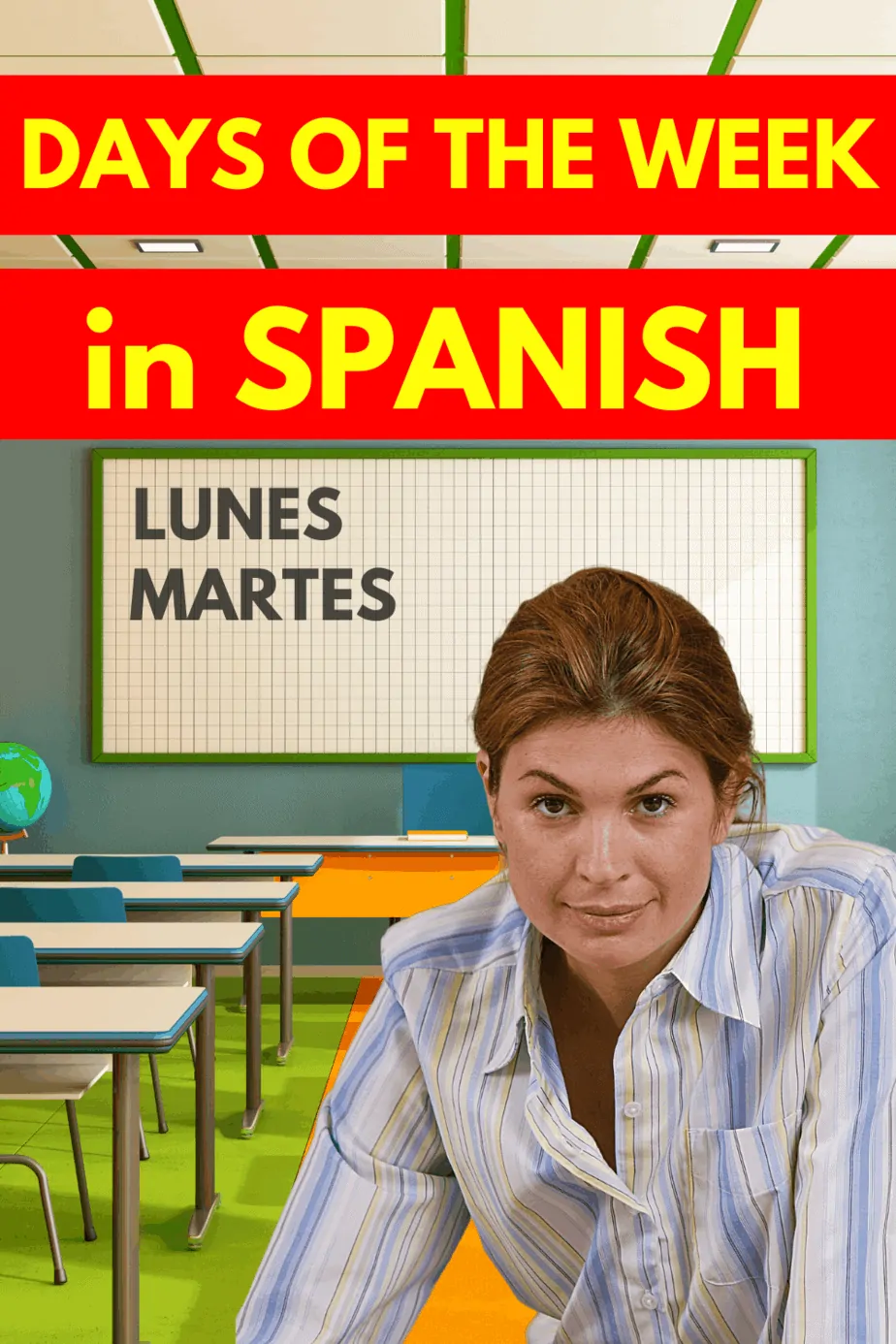It all began in ancient times. Like all romance languages, Spanish words have their origins in Latin, the language of the Roman Empire.
In those times, the stars had a big say in people’s lives and language conventions.
That is why, in the first place, the days of the week are seven.
This is because each phase of the moon lasts seven days. Apart from that, there were other astronomic reasons as well. Interesting, uh?
Let us dive right in!

What are the days of the week in Spanish?
The days of the week in Spanish are:
- lunes – Monday
- martes – Tuesday
- miércoles – Wednesday
- jueves – Thursday
- viernes – Friday
- sábado – Saturday
- domingo – Sunday
Ancient people were so into astronomy! After all, there was no Netflix back in those days.
Watching celestial bodies is what entertained them, and as they were totally out of their reach and control, they found them even more fascinating.
This is why each day of the week was named after the seven celestial bodies that could be seen in the skies (and the only ones they knew about in the past). These were the Moon, Mars, Mercury, Jupiter, Venus, Saturn, and the Sun.
You must be wondering why these names don’t ring a bell at all when we think of the days of the week in English. They certainly make a lot more sense in Spanish, my fellow learners. Let’s take a closer look!
Lunes por la Luna – Monday in Spanish
The first day of the week, known as Monday in English, is actually not that hard to link to the connection in Spanish I am about to explain. See, Monday begins with MO, which very easily reminds you of MOnday, right? It is the same logic in Spanish.
The ancient Romans thought first of the Moon, which is luna in Spanish.
LUNa then onomatopoeically reminds you of LUNes. Fun fact: There is a very popular poster that kindergarten teachers post in their classrooms in Peru (the country I am from).
I can still recall a really cute picture of the luna (moon) for lunes (Mondays) in my classroom when I was little. Some popular expressions for this day of the week in Spanish are:
| Singular | Plural |
| El lunes | Los lunes |
|
Examples: El lunes comienzo la dieta. (I’ll start my diet on Monday.) ¡Odio los lunes! (I hate Mondays!) |
|
Martes por Marte – Tuesday in Spanish
The second day of the week, known as Tuesday in English, has a very easy-to-remember link: Mars. This one, in particular, sounds the same at the beginning in the Spanish form, as the planet Mars is Marte in Spanish.
We will use the same logic as the beginning sound of MARTEs is exactly the same as MARTE, the planet. There is another object in that kindergarten poster I mentioned above.
My classroom poster would have a picture of a martillo (hammer) for martes (Tuesdays) for us to recall that day of the week. Some examples with sentences in Spanish for this day of the week are:
| Singular | Plural |
| El martes | Los martes |
|
Examples: El martes vendré a cenar. (I’ll come for dinner on Tuesday.) Los martes tengo clases de piano. (I have piano lessons on Tuesdays.) |
|
Miércoles por Mercurio – Wednesday in Spanish
This will get a bit tricky now but don’t worry. Let me explain. The third day of the week, Wednesday in English, is associated with Mercury.
In this case, it is similar (but not exactly the same) to the pronunciation of the day in Spanish, as the planet Mercury is Mercurio in Spanish.
In this case, we will try to focus on the sound of the beginning of the word MIÉRColes. It sounds quite similar to the word MERCurio, the planet. You can imagine if it was tricky for Spanish learners, kindergarten kids would have a hard time remembering that one.
That is why the image shown for us Peruvian kids would be a jar of miel (honey) for miércoles (Wednesdays) to help us recall the third day of the week in a friendlier way.
Some examples with sentences in Spanish for Wednesdays are:
| Singular | Plural |
| El miércoles | Los miércoles |
|
Examples: El miércoles tengo una cita. (I have a date this Wednesday.) Los miércoles vamos al cine. (We go to the movies on Wednesdays.) |
|
Jueves por Júpiter – Thursday in Spanish
Moving on to the fourth day of the week: Thursday. This day is easy to recall in English with the planet Jupiter. The spelling of the whole word is basically the same in both languages, as the planet Jupiter is Júpiter in Spanish.
As you might have guessed by now, the beginning of the word JUeves is the same as JÚpiter, the planet.
This was our favorite day of the week with regard to the memory aids in kindergarten.
The poster showed a picture of a lot of juguetes (toys) for jueves (Thursdays) for us to recall that day of the week, and it was the day of playing games, too! Let’s see some examples for Thursdays in Spanish:
| Singular | Plural |
| El jueves | Los jueves |
|
Examples: El jueves voy al dentista. (I’ll go to the dentist on Thursday.) Los jueves jugamos tenis. (We play tennis on Thursdays.) |
|
Viernes por Venus – Friday in Spanish
Our favorite day of the week is finally mentioned in this article. Everyone loves Fridays. This day of the week was named after the planet Venus.
As with Wednesdays, we have to find the logic in beginning sounds that are alike for Spanish correlation. First of all, the spelling of the whole word is exactly the same in both languages, as the planet Venus is Venus in Spanish.
Now, focus just on the beginning of the word VIErnes and try to link it with VEnus. Like with miércoles (Wednesdays), the logic was not that logical for us in kindergarten!
The poster showed a picture of a lot of a cloud blowing viento (wind) for viernes (Fridays) to make our lives and understanding easier!
Some sentences in Spanish are:
| Singular | Plural |
| El viernes | Los viernes |
|
Examples: El viernes tengo una fiesta. (I have a party on Friday.) Los viernes son mi día favorito. (Fridays are my favorite day.) |
|
Sábado por Saturno – Saturday in Spanish
The first day of the weekend makes its appearance: Saturday. It is one of the easiest ones to recall for English speakers. The spelling of the whole word is easy to remember, for the planet Saturn is Saturno in Spanish. Now, the beginning of the word SÁbado is the same as SAturno, the planet.
Sadly, our kindergarten mnemonics end up here, as there’s no school on weekends, so that we won’t hold a grudge on that.
A way to remember, however, can be picturing in your mind a nice set of sábanas (bed sheets) for sábados (Saturdays) because, after all, weekends are for resting in bed!
Also, it is a good way to recall both spelling and pronunciation, which are very similar for these two words in Spanish. Some examples of sentences in Spanish for Saturday are:
| Singular | Plural |
| El sábado | Los sábados |
|
Examples: El sábado iré al banco. (I’ll go to the bank on Saturday.) Los sábados vamos a la playa. (We go to the beach on Saturdays.) |
|
¿Domingo por el Sol? – Sunday in Spanish
After a lot of logic and related spelling and sounds, we finally get to the moment of asking ourselves: What is the logic (if any) for naming Sunday “domingo” in Spanish? We know it makes sense in English, absolutely.
The spelling in English comes from the Sun; therefore, it is Sunday. In this case, it has nothing to do with the spelling of the word SOL (the Sun) in Spanish.
As Christianism arrived in the Roman Empire, the “day of the Sun” was changed to DOMINICUS, which means “the day of the Lord”.
Now it does make sense as DOMINicus reminds us easily of DOMINgo, the last day of the week. I don’t really have a mnemonic technique this time, but I can give you some useful examples of the way we use this in Spanish:
| Singular | Plural |
| El domingo | Los domingos |
| Examples: El domingo iré a casa de mamá. (I’ll go to my mum’s on Sunday.) Los domingos duermo mucho. (I sleep a lot on Sundays.) |
|
Everything about the days of the week in Spanish
It is a lot to think about, but with the visual aids, it gets very easy and fun to remember. If you want to practice a little, take a look at this worksheet I’ve prepared for you.
I even included the images of the poster I used as a child to learn these words myself, so I hope you find it useful. If you liked this article, don’t forget to share it with everyone who wants to learn more about Spanish and our culture.

Hi! My name is Pierina Sánchez and I am a Foreign Languages teacher (English-Spanish), foodie, wanna-be fashionista and full time mom. I dedicate my life to helping others learn not just about the language but also the cultural differences between these two beautiful languages. Being Peruvian surely adds up a Latin American perspective, especially to those who want to visit this part of the world.

